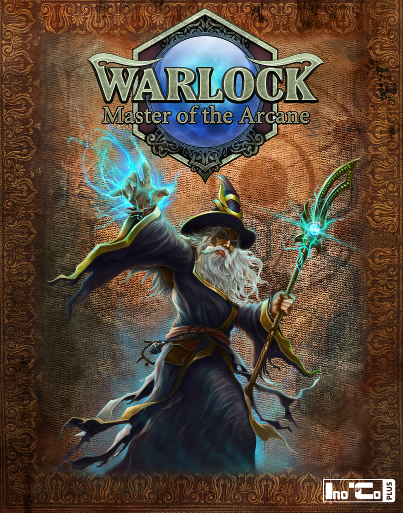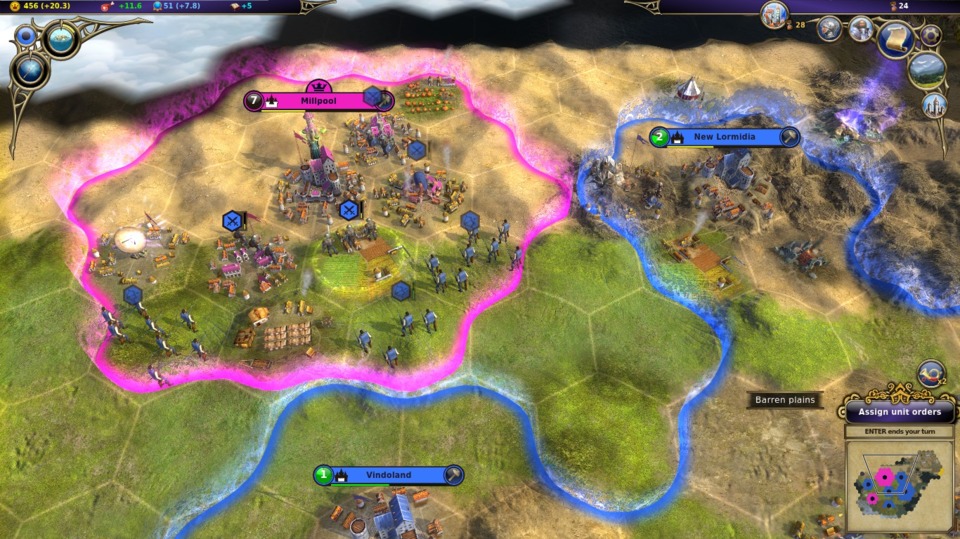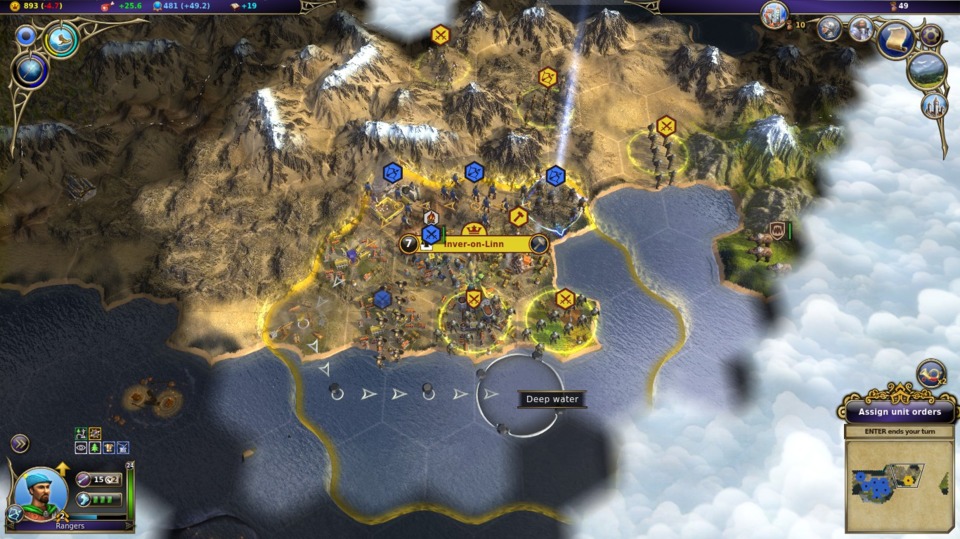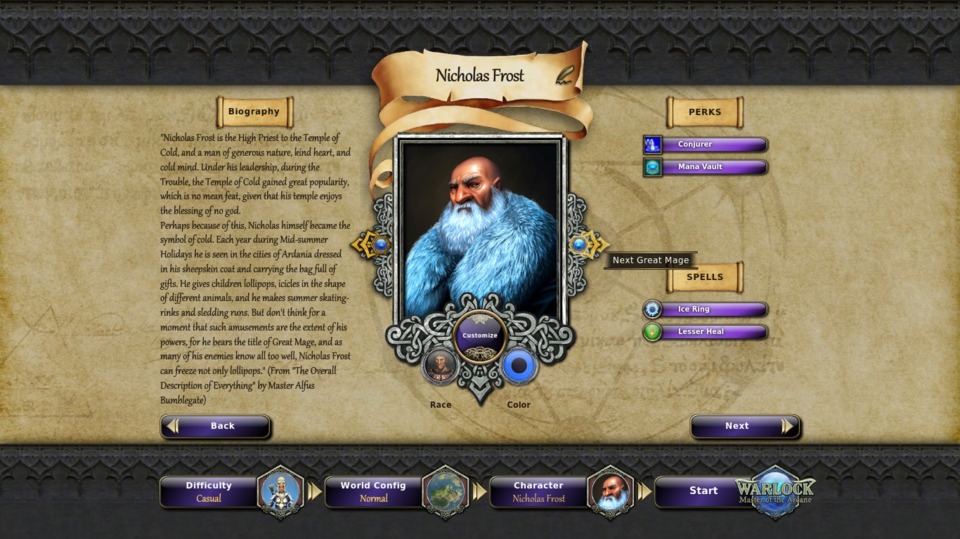Mento's May Madness Melange: #1A - Master (of Magic) Blasters
By Mento 1 Comments
May Madness begins this year with a special feature; the rest of this month will be a little more compact than this. But first, some backstory: One of the few PC games I'm known to obsess over, perhaps to the point of worrying some people, is Simtex's Master of Magic. Master of Magic was a Civilization clone that appeared halfway through the 90s (you could buy a floppy disc version!) with the idea of inserting fantasy elements into what was already a well-established civilization-building strategy-simulation matrix that would go on to produce Sid Meier's Colonization in the same year. Master of Magic included spells to cast, monsters to summon, different fantasy races to rule over, dungeons to raid, treasures to acquire, heroes to level-up and an entirely different alternate universe that you could hop into whenever things got too dull. It was a goshdarned masterpiece, and expanded the Civilization paradigm far more than merely adding hexagons or cultural victories or a handful more historical figures could ever hope to accomplish. On top of everything else, it included a very in-depth combat engine that allowed armies of several disparate units to face one another in an isometric battlefield, controlled tactically like a strategy RPG with spells flying every which way and untold riches to be uncovered for those daring enough to attack a horde of monsters in their own lair. But hey, don't take my word for it. (Or rather, do take my slightly older word for it.)
Since then, possibly due to a new influx of fans from Master of Magic's availability on GOG.com, there's been a fairly recent spate of fantasy strategy games that claim to be in some way directly inspired by Master of Magic and even its successor, or at the very least took a few of its lessons on how to build a kickass fantasy Civilization variant to heart. Today's May Madness Melange looks at three games in particular that seemed to have been developed with my beloved Master of Magic in mind, and in a special one-off format for this feature, we'll also consider how they stack up to the grand-daddy itself.
Here's the eight-fold criteria that I feel best represent Master of Magic and its appeal:
- Spells, and lots of 'em. Why play a fantasy version of Civilization if you aren't able to take full advantage of its unique, invaluable resource: Magic, or in the words of Vaarsuvius the Elf: "Telling the Laws of Physics to shut up and sit down." When I'm talking spells, I want conjurations that range from basic-ass fireballs and heals all the way up to global enchantments and summoning damn dragons out of the ether. I want to take a regular catapult unit, cast Invisibility, Flight and Haste on it and scare the bejeezus out of some hapless village militiamen. I want to cast spells that summon volcanoes all across the world that directly grant me power, create a horde of zombies in place of every unit I kill, lift my capital city into the clouds where it cannot be touched and maybe stop time itself. Small thing to ask, right?
- A set-piece tactical combat system with strategy n' shit. I don't mind Civ's format of building a big stack of units and throwing them at another big stack of units to see what happens. Really. But it's very easy to grow tired of what is essentially a pog battle. I want to be able to direct all my units individually in battle. I want all those units to have their own specific roles to adhere to. I want to worry about terrain, ranged attack distance, attack and defense modifiers, special unit abilities and all manner of unforeseen wrinkles to cope with. It's what makes each battle in Master of Magic fun and different, at least until you get to the point where you're railroading everything. But that's fun in its own way too.
- Ruins and dungeons to explore. Sometimes I want to take a detour, or feel that I'm not quite prepared enough to take on a rival wizard warlord. How to tip the scales in my favor? Well, maybe with a spot of dungeoncrawling. Any given randomly generated Master of Magic map will often be filled with various ruins, lairs, elemental nodes, arcane towers and pits of unspeakable evil that the enterprising (and brave) hero and his army can ransack for Gandalf knows what. Half of the fun is discovering what sort of enemies are lurking inside, and the other half is finding out what treasures are ripe for the riflin' through once the battle's over. (Well, and the battle itself is pretty fun. I guess I suck at fractions.)
- Hero and army customization. Hero units in strategy games are usually slightly stronger variants of regular units that the game politely asks you to keep alive at all costs. In Master of Magic, they're customizable heroes with their own level-up progression trees and slots for stat-enhancing artifacts you either come across in dungeons or buy from merchants (or pick off the bodies of other hero units). Likewise, Master of Magic offered a similar progression system for regular troops, albeit to a much lesser extent. Troops get stronger as they fight in more battles, and provide hidden depths of talent when they reach higher levels of seniority.
- An extensive city-building feature, that allows for various different types of city layout depending on its location and resources. Do you focus on producing bad-ass martial units by building things like barracks, war colleges and stables? Do you focus on gold, mana or food production with their respective generators (usually marketplaces, shrines and granaries, respectively)? Do you build a city to take advantage of some nearby special resource nodes? Bonus points for allowing the establishment of trade routes and city enchantments, because at that point you're getting into some serious shit.
- An array of fantastical races and magic disciplines to invest in. Another benefit of setting one's Civilization game in a fantasy universe is having all those elves, goblins, dwarves, halflings, orcs, beastmen and other monsters wandering about. Most have their own versions of civilization, and their own special traits inherent to their species. Building a bunch of human cities is all fine and good, but maybe I want a Elvish forest as part of my empire so I can supplement my armies with a few skilled rangers, or by entreating with some dwarven lords I might end up with a few war machines. Equally, being able to focus my spellbook towards nature, sorcery, chaos, death or life magics not only extends the game's replayability, but allows me to stick with the preferred type of magical assistance I intend to employ in this run, whether I want to heal my own units or devastate my opponents'. Or slay them dead and raise them as zombies and skeletons to add to my own unstoppable army of the damned. It's all good.
- That wonderful feeling of late-game invincibility, usually the result of breaking the game in some way by gaining too much power. I'm not sure how to put it any more succinctly than that, but part of the joy of Master of Magic, and this is entirely from me playing on easier modes like a big wuss, is how omnipotent this game makes you feel. In Civilization, it's easy to feel smug that your technological advancement is allowing you to unlock the secrets of gunpowder before everyone else and laying waste to their non-gun-owning derrieres like it was the Satsuma Rebellion. But in Master of Magic, you can dominate your opponents utterly with not only a superior show of forces but a considerable amount of magical power under your pointy hat. It's fine and dandy to sit outside an enemy capital with a massive army of soldiers to make them sweat a little, but something else when you turn the sky over said capital blood red and start raining meteors down from it. But that's not to say your godlike intimidation is limited to your fellow wizards, oh no. There's a point in every Master of Magic run, early on, where you find a dungeon that's simply far too dangerous for you to cope with: either some wiseguy filled it with dragons, or you get quickly annihilated by a huge army of ranged units that just pick you apart in seconds. Marching right back in several dozen turns later with an unstoppable force of badass monsters, heroes and veteran units hits a level of catharsis generally only reserved for getting home and relieving oneself after a five hour train journey.
- I didn't find it boring. This one's pretty self-explanatory: I find a lot of strategy games boring. They never seem to hold my interest in the long run, for whatever reason, and it's the biggest problem I tend to have whenever I play one of these games. My ADD isn't so bad that I can't concentrate on reaching the end of a particularly fortuitous run, but I'm often feeling a sense of unenthusiastic obligation to see it through before that happens. The difficulty balance is sometimes responsible for this too: If I want to play at a level where the computer doesn't cheat, it tends to make them far too easy to predict and overcome in turn. Truly, this is the hardest criteria to meet, and obviously the most subjective.
Lesson here, Bey: You seek the Spell of Mastery, you best not stutter.
Warlock: Master of the Arcane

Warlock: Master of the Arcane (boy, that really puts the "subtle" in "subtitle", don't it?) is a turn-based strategy game from Ino-Co that is based on their Majesty universe of RTS games. More importantly, at least for this feature, it's a game that very deliberately uses Master of Magic as a basis for many of its gameplay systems, which becomes quite evident the more of it you play. The game uses a hexagonal grid, with each city's territory encompassing the six outer grids (and eventually the twelve surrounding them once the population increases sufficiently, and then onto the eighteen surrounding those...). In each hex you can build a new structure, which increases the city's food, mana or gold production rates or allows the recruitment of stronger units. Certain structures also provide "perks": upgrades that can be applied to any applicable unit in your charge for a price. Certain special resource nodes, such as a pumpkin patch or a magical field, can receive special variants of common structures that provide a larger production boost (so for pumpkins, you can make a pumpkin farm that produces a lot more food per turn than a normal farm).

For the sake of transparency, I'm playing a regular campaign against three opponents on the "casual" setting, which is second lowest between Normal and Beginner. Two reasons: This is the difficulty level I enjoy most in Master of Magic, where I don't have to be concerned for unfair AI practices and can run rampant, and the second reason is because this is a new game and I'm not going to get taken out halfway through before I get a sense of what it's about. I'll be following a similar strategy with the other two games featured.
The Master of Master of Magic?
Introduction over. How does it compare?
- There are indeed spells. A limited assortment, but they slowly grow in number. This element has been somewhat truncated from MoM, but that seems to be for the sake of streamlining, as is the case with many other aspects we'll cover on this list. Having less moving parts makes Warlock considerably less buggy than its spiritual antecedent, so there's something to be said about slimming down the number of spells and other elements to make sure everything doesn't blow up every five minutes. Warlock does retain the idea of an "active pool" and "reserve pool" of magic: the former is how much you're allowed to cast in one turn, while the latter is simply how much mana you've stockpiled thus far. Certain buildings, enchantments and summoned monsters drain the mana supply every turn, while having a lot of territory, certain other buildings and special events increase it. It's standard Master of Magic stuff for the most part, then.
- Unfortunately, there is no big strategic set-piece combat. Rather, it takes the Civilization route of having all battles take place entirely on-map, between two units at a time, with damage decided via dice rolls. It's fine (I mean, Civ still uses it, right? Can't be all bad), if not my preference.
- There are dungeons, but most are simple monster generators that need to be removed. Others are simply non-combat one-off cash/rewards, occasionally providing new spells or special items. Nothing too exciting.
- There are heroes, and they each have their own individual level-up paths. They can also equip items you find, so it feels pretty MoM-y so far. Armies go up levels too. The level-up process has been customized so that the player can select one of three abilities to impart on their promoted unit, allowing for identical units to take on separate personalities and specializations. For instance, two initially identical warrior units might eventually be made distinct from one another by how one has focused on defense increases while the other takes mostly offensive increases - in terms of strategy, the former can lead the way and take the enemy's hits during the opponent's turn, while the latter can charge in afterwards and do all the significant damage. It's simple but elegant, and though there's less overall abilities available it manages to feel more customizable.
- The city-building has been modified so that all new buildings are placed within a city's overworld territory, rather than all being inside the one city square. There's a hard limit on the number of buildings based on the city's overall population score and the number of available spaces, some of which won't take buildings of a certain type or have penalties of some kind; desert tiles provide less food but more mana, for instance, so it's best to put mana-production structures there and farms elsewhere. Special mineral spaces are now configured so that special buildings can be built on them (usually stronger variants of pre-existing buildings, such as a more powerful Smithy on top of an iron deposit) before the player can gain any benefit. Of the many differences between MoM and Warlock, this is one where I'm absolutely in favor of Warlock's approach.
- Races appear to be limited to three broad categories: humans, undead and beastmen. Humans are simply humans. Undead can mean liches, zombies, skeletons, spirits and all sorts, and have their own rules for healing and support magic. Beastmen seem to be mostly rat-based as far as civilizations go, but also include a lot of other bestial hominids. There are also wandering monsters, from simple wolves and bears to elementals, giant spiders and ogres. Overall kind of lacking (though, once again, seemingly to keep things mechanically simple and streamlined).
- As for the invincible feeling, it's already there. I believe I'm considerably more powerful than either of my rivals, neither of whom seem particularly keen on attacking right now. I want to keep progressing up technology/magic trees and taking down more powerful wandering monsters, but it's starting to feel like overkill. Sweet, wonderful overkill. I may just continue progressing in this fashion until I cast the Spell of Unity, which appears to be this game's version of the Spell of Mastery.
- I'm definitely not bored yet. It's actually quite fun, partly due to how accessible it is. Because of all the streamlining aspects, and the two easier difficulty modes (as stated, I'm on "casual", which isn't even the easiest setting), it's not hard to get to grips with its few mechanics. I don't feel completely lost at sea because I skipped out on hours of tutorials, which is how most strategy games seem to go. That's an important consideration in its favor.
Additional Info
Warlock's very clearly based on Master of Magic, though has a intrinsic sense of sticking to the core essentials in lieu of many extra customization options and a dense inventory of monsters, spells and the many other appendices that lent Master of Magic its considerable replayability factor. Many elements are de-emphasized in Warlock including the combat, the RPG aspects and the city-building but the elements that it retains are what definitely made Master of Magic stand out in my mind, if perhaps in an obvious "bulletpoint list on the back of the box" sense in some cases. It feels like a modern day budget/portable version of the game: better looking, a lot more stable but far less substantial. However, even with its comparative lack of features, it does at least get the most important part right: The game is fun to play, and provides that same giddy sense of unstoppable powermongering. I mourn the lack of complexity, but I'm sure the game's not lacking for challenge if that's what a player might be looking for with a game like this.

I've also noticed that the AI is built the same way: opponents will constantly found new cities a scant few blocks away from the capital (and yours), forcing both cities to rake in less resources and be limited in growth as a result. It's a slightly more effective plan in Warlock though, due to how territories work and how the borders of influence expand ever outwards as the cities' populations grow: creating a town close to your opponent means they're effectively stymied from progressing in that direction, and allows you to picket more land for yourself. It also appears as if allied cities can swallow one another as their borders touch, so it's not like you're able to scupper your own capital's potential. Plus, with how resources work, it's important to ensure that a useful node is within the sphere of your influence by hook or by crook. Warlock does have a few tricks up its sleeve, and is actually at its most compelling when it's introducing aspects that were never even featured in Master of Magic: though it feels as if it's sometimes content to simply try to be a much smaller modern version of the original Master of Magic, the few steps it takes towards being something entirely different are what makes it interesting.
I might go so far as to suggest that Warlock is the Civilization Revolution of MoM, given how that game made certain aspects of that series more accessible and let it move at a faster pace without actually taking too much away despite the relative lack of complexity. Of course, Civ Rev was a version of Civilization built specifically for consoles and Warlock is PC exclusive, so it's not a perfect analogy.
Final Thoughts

As I (temporarily) end my run after fifty turns of this campaign, the Mighty Santa Empire continues to grow unabated and has now devoured most of the central continent of the main world. From all accounts, our two rivals (that is to say, the ones that remain) have eked out small empires of their own, but it's clear our librarian friend has but a single city to his name. We've surrounded it utterly, sneaking in under the facade of peaceful intent, and all it'll take is a declaration of war for us to converge on the capital and take it down instanter. Meanwhile, we've discovered bountiful lands in the west, but are still in the process of clearing out its considerable monster population. We'll have to find out if there's any monster generators nearby, and then move some settlers in to create a city and take advantage of the special nodes around here. The only X factor remains the Rat King, holed up in the North somewhere. The meager troops he's so far shipped over to our continent did not survive long. Technologically speaking, I have access to catapults, mages and halberdiers, but my money flow is still a net loss, so I'll be focusing more on buildings which promote gold production and perhaps disbanding a few of my inferior units and replacing them with a smaller number of superior ones. I'm loath to remove any veteran units, but it's not like their forward advance can compete with a trebuchet boulder for sheer destructive power.

And then there are the other two worlds to consider. What dangers and mysteries do they hold? And will I even need to plumb their riches and artifacts to utterly destroy what's left of my opponents? Maybe I'll just pop over there for funsies.
Onward to Part 1B (Disciples II: Rise of the Elves) >
